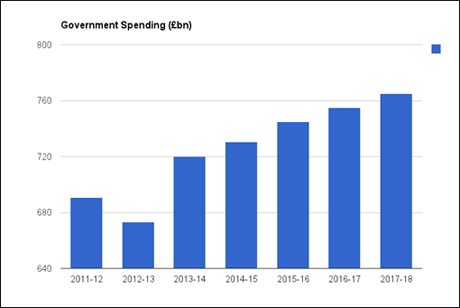
Britain’s economy is still in deep trouble.
Chancellor George Osborne threw out a few eye-catching initiatives, which we’ll cover in more detail shortly. Some were good ideas: the drop in small companies’ national insurance bills is good news, as is the scrapping of stamp duty on Aim shares – my colleague Tom Bulford will be pleased about that one, I reckon.
And some were bad ideas – the initiatives to help people buy houses will boost home builders’ profits and help prop up banks, but it’s hardly helping to rebalance the economy away from our ludicrous obsession with property prices.
But overall, nothing has changed.
The government continues to ignore the fact that it spends too much and is relying on optimistic views of future economic growth to cut the budget deficit. The forecasts from the Office of Budget Responsibility (OBR) border on a joke. If proof was ever needed that humans are lousy at predicting the future, then look at the OBR’s record.
Can Britain really grow?
The OBR has cut its forecasts for growth again. In June 2010, it predicted that Britain’s economy would be growing by 2.9% a year in 2012/13. Now it says it will be just 0.6%.
| OBR GDP Forecasts | Dec 2012 (%) | Mar 2013 (%) |
|---|---|---|
| 2013 | 1.2 | 0.6 |
| 2014 | 1.2 | 1.8 |
| 2015 | 2.3 | 2.3 |
| 2016 | 2.7 | 2.7 |
| 2017 | 2.8 | 2.8 |
Source: OBR
So you can understand why I might be skeptical about the OBR’s prediction that the economy will start growing strongly again from next year. In fact, there have been virtually no changes to its growth forecasts from 2014 to 2017. Meanwhile, the government is still expected to add over half a trillion pounds to the national debt over the next five years.
| OBR Deficit Forecasts (£bn) | Dec 2012 | Mar 2013 |
|---|---|---|
| 2012-13 | 119.5 | 114 |
| 2013-14 | 99.3 | 107.6 |
| 2014-15 | 88 | 97.3 |
| 2015-16 | 73.30 | 87.1 |
| 2016-17 | 49 | 60.8 |
| 2017-18 | 31.3 | 42.1 |
| Cumulative Addition to Debt | 460.4 | 508.9 |
Source: OBR
The OBR likes to talk about things such as spare capacity, potential output and by how much theoretically the UK economy can grow. It can then stick some numbers into spreadsheets and fancy economic models and come up with a forecast.
But this conveniently ignores some hard facts. Britain’s economy will not recover quickly because the previous period of expansion was not sustainable. It was based on excess credit and excess consumption.
Too much money was spent on things that will not give an economic return. When a business invests, it looks to get a cash return on the cash it spends. If it makes a mistake then the business and its shareholders suffer. The government and too many consumers borrowed money to spend on things that don’t give any cash back.
The government spent too much on things like public sector wages and quangos and got too little back in terms of output in return. The public spent too much on property and consumer goods. Property prices stopped rising, but the debts remain – and in the government’s case it continues to spend far too much.
However, the OBR thinks that consumers will lead the economic recovery by running down their savings and spending more. Will they really do this?
Well they might run down their savings, because the government is relying on the Bank of England printing presses to create inflation to get rid of the debt. This was borne out again today by Osborne’s comments which basically gave the Bank a green light to continue ignoring its inflation target.
The higher inflation that is already being seen in energy prices and imported goods looks set to continue and will put more pressure on households to make ends meet. With wages currently growing at just 1.2%, consumers are set to become worse, not better off, and look in no position to rescue the economy.
I hope Osborne and the OBR are right about the pace of economic recovery. But I suspect that they are too optimistic and that Britain’s debts could go a lot higher than people expect as growth disappoints. If the economy can only grow by 0.5-1% (or less), then borrowing will be a lot higher, as the projected tax receipts won’t be pouring into the Treasury’s coffers.
Unfortunately, Britain’s political classes will always think of themselves before the long-term needs of the country. Instead of doing the right thing and chopping down the size of the state and cutting taxes, they are choosing inflation instead which will make most people worse off.
What does it mean for your money?
The new Bank of England governor will be there to fund the government with his printing press in an attempt to keep the bond market vigilantes at bay, but this might mean that the value of the pound could fall further.
We’ve been saying for a while that high inflation and a falling pound that comes from Britain’s economic mess is not good for people’s savings. That’s why investing in overseas assets is a good thing to do – as the pound falls the value of overseas investments could go up.
You can do this by buying overseas shares, property or inflation protected bonds. All of these types of investments can be bought and sold relatively cheaply and easily through exchange-traded funds (ETFs) from stockbrokers.
My colleague John Stepek pointed out some ways to diversify out of sterling and the UK in a recent MoneyWeek cover story: How to avoid a pounding in the currency wars. If you’re not already a subscriber, subscribe to MoneyWeek magazine.